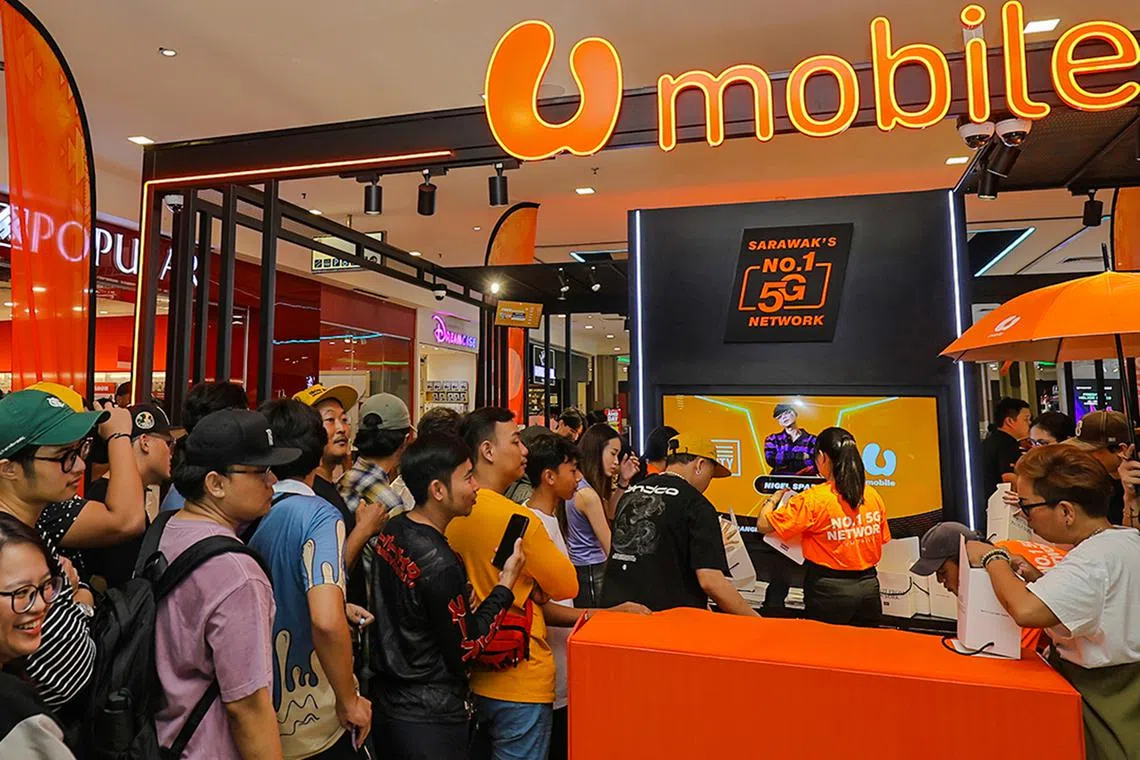U Mobile responds to concerns over its winning bid for Malaysia’s second 5G network
Sign up now: Get insights on Asia's fast-moving developments

U Mobile was announced as the winner of the restricted tender on Nov 1, ahead of market leader CelcomDigi and Maxis.
PHOTO: U MOBILE/FACEBOOK
KUALA LUMPUR – Malaysian mobile operator U Mobile has responded to growing concerns after it won a bid last week to build Malaysia’s second 5G network,
Its Nov 10 press release comes after persistent questions from political and business circles as well as media reports asking why the proposal by the smallest of three telecommunications companies that took part in the 5G tender was chosen, especially given that nearly half of U Mobile is foreign-owned.
The statement also confirmed that ST Telemedia, a wholly owned arm of Singapore’s investment company Temasek, “has agreed to the strategic alignment of its shareholding” by reducing its stake from 48 per cent to 20 per cent in U Mobile, which also counts Malaysia’s King, Sultan Ibrahim Iskandar of Johor, and Berjaya magnate Vincent Tan as its main shareholders.
“While foreign ownership is common in the telco sector, U Mobile’s strategy prioritises Malaysian industry development and strengthening of local ownership. This increased local partnership supports U Mobile’s dedication to national interests,” the telco said, adding that its 5G roll-out would strengthen local engagement and participation in critical telecommunications infrastructure.
U Mobile was announced as the winner of the restricted tender on Nov 1, ahead of market leader CelcomDigi and Maxis, both of which have more subscribers and transmission sites, as well as higher revenue. Maxis, in particular, had responded to news of the award of the prized 5G spectrum to U Mobile by pointing to its 77 per cent Malaysian ownership.
Industry sources told The Straits Times that the telcos prefer not to take a stake in the government-led first network that has already reached 82 per cent coverage. Instead, they want to own the second network so that they can utilise their existing assets, do a demand-driven roll-out for better cash flow and control 5G spectrum bands, which are high-value assets for their balance sheets.
Hence, the likes of opposition MP Wan Saiful Wan Jan have claimed that the award of the 5G spectrum has multiplied the value of U Mobile, making “the ultra-rich Singaporean owner richer after this divestment of U Mobile”.
While Communications Minister Fahmi Fadzil said in Parliament on Nov 7 that the decision was based on merit, critics, even within the ruling Pakatan Harapan coalition, have questioned the lack of details about the tender specifications.
Pasir Gudang MP Hassan Karim, who like Mr Fahmi and Prime Minister Anwar Ibrahim hail from Parti Keadilan Rakyat, has questioned whether “the selection of U Mobile... factored in any specific individual who owns a share” of the company.
But U Mobile, the youngest of the three bidding telcos, said on Nov 10 that its track record in the past 17 years shows it can be relied on to “deliver rapid and cost-efficient 5G roll-out for Malaysia”.
The telco pointed to how it had invested more than RM5 billion (S$1.5 billion) in its network infrastructure, giving it over 10,000 sites, which is just shy of Maxis’ last reported 11,000; it also cited how it had grown its national population coverage from 67.5 per cent in 2018 to 95 per cent in 2024, moving it on a par with its peers.
“As the most recent late entrant and market challenger, U Mobile has been an industry champion of affordability by offering products and services that are of similar or better specifications but at a 20 to 25 per cent reduction below competitor prices, an approach that the telco still implements today,” it added.
U Mobile cited subscriber plans from as low as RM15 per month that has helped drive its subscriber base to nine million. CelcomDigi, named after the two telcos which merged in 2022, has over 20 million customers while Maxis has close to 13 million subscribers.
“U Mobile will continue to innovate products and services whilst actively deploying the second 5G network, and would like to assure all stakeholders that it will continue to be well supported with no reliance on government funding,” the telco added.



